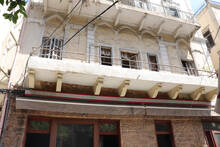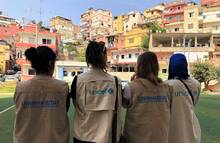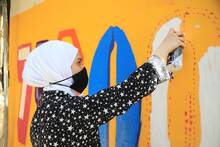UN-Habitat has been working in Lebanon since 2006, establishing its country programme following the 2006 July War, when it contributed to the wide-scale recovery and reconstruction of south Lebanon, through housing reconstruction, shelter provision, infrastructure projects, and technical assistance at the municipal level, among other interventions. Since then, the UN-Habitat Lebanon Country Programme has expanded to meet emerging urban needs and address long-standing urban challenges through a humanitarian, development and peace nexus approach, by integrating research and normative work into operational implementation. This has included more than a decade-long multisectoral and area-based urban crisis response programme in light of the world’s largest displacement crisis caused by the onset of the war in Syria in 2011, resulting in Lebanon hosting more than 1.5 million refugees.
In addition, UN-Habitat’s work has been aimed at responding with targeted interventions to meet new and emerging needs since 2019 – due to the multilayered and complex governance, socioeconomic and financial crisis in Lebanon, marked by steady deterioration of social stability and national and sub-national systems, as well as other shocks, such as the COVID-19 pandemic and the 2020 Beirut Port explosion. In 2024 and beyond, UN-Habitat focuses on supporting and implementing interventions related to urban crisis response needs across the country in a context of multiple compounding crises, with longer-term sustainable urban development principles as a foundation – bridging the humanitarian and development divide. In response to the expanding instability in the Arab region, and the vast spillover of the war in Gaza into Lebanon – resulting in enormous human, social, economic and environmental losses and challenges affecting various parts of the country, including numerous towns and cities – UN-Habitat aims to engage by providing immediate, medium- and long-term actions and solutions through the agency’s urban response, recovery and reconstruction expertise.
Country: Overview
Country: Overview
Country: Overview
Impact
Country: Impact and Urban Numbers
Across Lebanon, 37 photovoltaic systems were installed and activated in different public institutions including municipalities, hospitals, and schools. Due to these projects, around 2,480 MWh of energy is yealded per year, offsetting 1,533 metric tons of CO2.
Since 2022, around 10,744 individuals were supported on addressing HLP issues and more than 7,500 Syrian refugee families benefitted from HLP services by obtaining certificates
on their properties in Syria
290 municipalities were engaged in the implementation of different projects, 20 municipal basic services and local evonomic development projects were implemented, and 10 roadmaps developed towards a socio-economic plan for unions of municipalities.
Since 2022, 45 residential heritage units have been under renovation, 9 civil defense centres benefitted, 12 community and cultural centres were rehabilitated, 5 urban farming plots were upgraded, and 8 rainwater harvesting systems were installed.
Challenges
Lebanon's rapid urbanization since the 1960s, worsened by multiple successive conflicts and crises in addition to poor planning, has left its urban areas struggling with lack of basic services and infrastructure challenges. Decades of instability, economic collapse, and crises have further strained urban systems. In addition, since October 2023, the Israel-Hezbollah conflict has caused severe destruction of physical and environmental assets, including destroying or damaging over 60,000 buildings, as well as the displacement of around 1.2 million people, thus deepening Lebanon's urban crises.
The URFL approach: UN-Habitat plays a crucial role in supporting the transition from humanitarian response to recovery in Lebanon. This includes facilitating the rebuilding of settlements, ensuring that housing and infrastructure rehabilitation enables people to restore their lives. To support this transition, UN-Habitat conducts comprehensive multisectoral area-based urban profiles that include damage assessments, debris quantification, and socioeconomic analyses to inform the development of local recovery plans. Additionally, by working closely with local authorities and communities, the programme strengthens governance structures and fosters inclusive, sustainable recovery efforts.
To put this role into action, UN-Habitat Lebanon has developed an integrated Urban Crisis Response, Recovery and Reconstruction Framework (URFL) to guide immediate, medium- and long-term urban recovery. Through its participatory, multisectoral and area-based approach, the URFL focuses on restoring the urban fabric, strengthening local governance, ensuring housing security, and addressing environmental vulnerabilities in an integrated manner.
Our urban development projects
Country Beneficiaries
“Despite the fact that Saida attracts many tourists, we as citizens of Old Saida never felt that we are part of the touristic program in the city. The Cultural Heritage project will provide us with an opportunity to revive the tourism industry in Saida.”
Citizen in Old Saida
Donors and partners
Since 2006, UN-Habitat has established a large network of international, national and local partners – to ensure a nuanced and localized approach to its projects and interventions. UN-Habitat Lebanon’s donorship has and continues to enable the Country Programme to deliver. From projects on-the-ground that address the needs of residents, to research and analysis necessary to ensure targeted and impactful projects. The UN-Habitat Lebanon Country Programme’s activities cover both normative and operational work.
UN-Habitat works with local and national government; academia; civil society; local non-governmental organizations; and, UN sister agencies all to achieve UN-Habitat’s unified mission of achieving a better urban future for Lebanon.
Donors
Contact
Legacy content
The years 2015 & 2016 have, and will witness two major events: the endorsement of the Sustainable Development Goals (SDGs), and the Sustainable Urban Development Conference - Habitat III. Both are expected to shortly achieve positive impacts on the lives of people worldwide, especially on poor and vulnerable groups.
On 25 September 2015, the 193 countries of the UN General Assembly adopted the 2030 Development Agenda titled ”Transforming our world”. 17 Sustainable Development Goals were adopted with a will that each government with its relevant partners and actors will be working on achieving the identified targets under each SDG.
Goal 11 of the SDGs states that cities and human settlements should become inclusive, safe, resilient and sustainable. The 10 targets set under this goal imply exceptional efforts and collective work in order to be achieved by 2030. This involves amongst others, ensuring access to adequate, safe and affordable housing and basic services, sustainable transport systems, road safety, enhancing inclusive and sustainable urbanization, protecting cultural and natural heritage, etc.
The Habitat III conference that will be organized by the United Nations in October 2016 in Quito – Ecuador, will endorse the “New Urban Agenda” which should be implemented by all governments in the coming 20 years.
UN-Habitat, globally, and at the regional and country levels, will be aligning its strategies, programmes and action plans to become consistent with the targets of SDG 11 and with the recommendations of the New Urban Agenda.
In Lebanon, with the absence of a national urban policy and urban planning actors, the Country Programme will have to devote enormous efforts to lobby, promote, and implement programs and interventions that will contribute to achieving the targets of Goal 11 and the New Urban Agenda.
The Country Programme Document that will be prepared shortly, and which will reflect the strategy and planning of UN-Habitat Lebanon for the coming 5 years, will clearly indicate the planned activities, the adopted approaches, and proposed strategies, and their link in achieving SDG 11 and the New Urban Agenda.
Tarek Osseiran
UN-Habitat Lebanon
UN-Habitat Partners
Donors
The Government of Finland
The Government of Netherlands
The Government of Cyprus
European Union (EU)
The Italian Ministry of Foreign Affairs
Swiss Agency for Development and Cooperation (SDC)
UN Agencies
United Nations Development Program (UNDP)
United Nations High Commissioner for Refugees (UNHCR)
United Nations International Children’s Emergency Fund (UNICEF)
UN-Women
National Government
Ministry of Social Affairs
Ministry of Public Health
Ministry of Energy and Water
Ministry of Education and High Education
Ministry of Interior
Local Authorities
Municipality of Beirut
Union of Municipalities
National and International Organizations
Council for Development and Reconstruction (CDR)
American University of Beirut (AUB)
World Vision
Development for People and Nature Association (DPNA)
Makassed Philanthropic association
Young Men’s Christian Association (YMCA)
Lebanese-Palestinian Dialogue Committee (LPDC)



